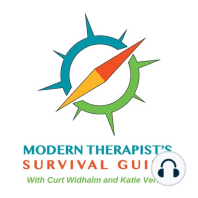32 min listen

How Therapists Promote Diet Culture: An interview with Rachel Coleman
FromThe Modern Therapist's Survival Guide with Curt Widhalm and Katie Vernoy
How Therapists Promote Diet Culture: An interview with Rachel Coleman
FromThe Modern Therapist's Survival Guide with Curt Widhalm and Katie Vernoy
ratings:
Length:
40 minutes
Released:
Feb 21, 2022
Format:
Podcast episode
Description
How Therapists Promote Diet Culture: An interview with Rachel Coleman Curt and Katie speak with Rachel Coleman, LMFT, CEDS about what therapists should consider in working with clients who have eating disorders, the impact of society on body image, and how clinicians can increase their competency in an area many feel they are lacking. Why do so many clinicians feel under trained in treating eating disorders? How do societal views impact our client’s body image and what is the impact of diet culture? Does a lack of graduate education in eating disorders ethically impact our ability to treat eat disorders in a non-specialized practice? What’s missing from our understanding of eating disorders? All of this and more in the episode. Interview with Rachel Coleman, LMFT, CEDS Rachel Coleman, LMFT, CEDS is a Licensed Marriage and Family Therapist and Certified Eating Disorder Specialist. Rachel received her Masters in Clinical Psychology from Pepperdine University, and shortly after began working at an Eating Disorder treatment center in Long Beach, CA. After five years of working as a Recovery Coach, Primary Therapist, and Program Director in treatment, Rachel shifted her work into private practice where she aids her clients in embodying daily the principals of eating disorder recovery. Rachel is also a certified Dialectical Behavior Therapist and has completed extensive training in the Intuitive Eating dietetic approach. She is a former board member of the International Association of Eating Disorder Professionals, through which she is certified as a Certified Eating Disorder Specialist. Currently, Rachel practices out of her private practice in Orange County, CA. In this podcast episode we talk about working with clients who have eating disorders. In honor of Eating Disorder Awareness week, we spoke with Rachel Coleman about the nuances in treating eating disorders and how clinicians can most effectively treat these clients within private practices. “We live in a society obsessed with diets and bodies. And so I think it's very easy for subconscious beliefs about food and bodies to infiltrate sessions, because it's subconsciously in us and so it can come out in our language.” – Rachel Coleman What do clinicians do when therapeutic interventions might trigger eating disorder behavior? Many interventions call for physical activity that might trigger eating disorder behavior or feelings in clients. If a client wants to participate in a physical activity intervention, consider their motivation. Ensure that a client has multiple tools in their anxiety toolbox. Be mindful if the modalities and treatment recommendations are based in fat phobia or weight stigma. How can clinicians assess their clients for an eating disorder? Eating disorders can present meeting full DSM-V criteria or, in many cases, seem at the “subclinical” or mildly clinical level. Evaluate how your client feels about societal messaging and the impact it might have on them. In assessing clients, look to determine the impact of behaviors and patterns on daily functioning. If client’s are sacrificing other values to focus on weight or body, it should be discussed. How can clinicians increase their education in treating eating disorders? Clinicians need to do their own work surrounding their bodies and internalized messaging. Therapists should focus on learning about the complexities of eating disorders and the social justice movements that surround weight stigma and fat phobia. Familiarize yourself with the ideas of body trust, body neutrality, and health at every size. Many treatment centers offer free webinars to educate clinicians in eating disorder treatment. “Let's face it, all of our clients have a body. And all clients are therefore going to have to figure out a relationship with their body regardless of eating disorder diagnosis or not.” – Rachel Coleman What are the ethical and legal considerations in treating eating disorders in a non-specialized privat
Released:
Feb 21, 2022
Format:
Podcast episode
Titles in the series (100)
Managing Your Online Reputation: Curt and Katie talk about navigating through negative Yelp Reviews, Google Searches, and Therapist Facebook Groups by The Modern Therapist's Survival Guide with Curt Widhalm and Katie Vernoy